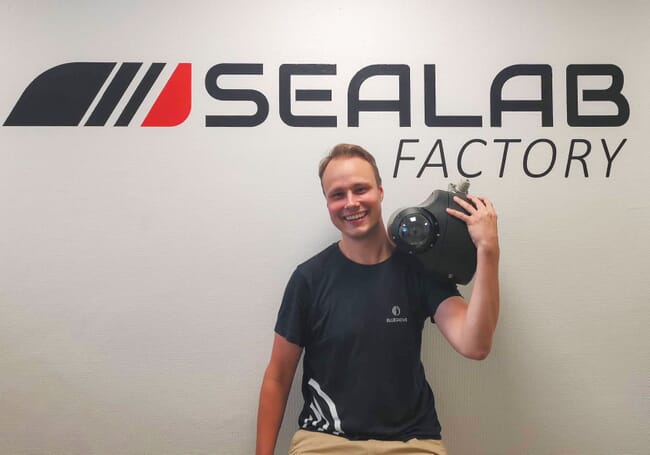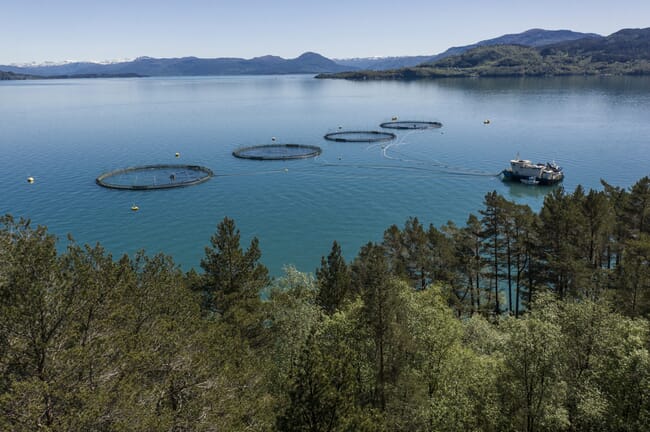“By bringing together two of the world leaders in aquaculture sensor technology, we will deliver solutions that improve the welfare of farmed fish and raise productivity levels in the salmon farming industry,” said Bendik S Søvegjarto, CEO, Bluegrove.
Experts from the two companies will combine their insight and knowledge to improve how fish are being observed and how behaviour is being analysed.

“Advanced computer vision and machine learning techniques make it possible to get a better understanding of the underwater situation in sea-based salmon farming,” said Hans Michael Hansen, technology investor and board member of SEALAB Ocean Group.
SEALAB’s underwater light and camera vision technology will be merged with acoustic underwater sensor technology developed by Bluegrove subsidiary CageEye.
“Both solutions are used to monitor fish in cages in order to develop a better understanding of their behaviour and their feeding requirements, but each one makes quite different observations,” Søvegjarto explained.
Bluegrove’s hydroacoustic sensors are used to observe the behaviour of the entire school of fish in a cage, while SEALAB’s state of the art image quality allows feed operators to see pellets and fish where other cameras cannot.
“Each solution delivers vast sets of data, and these will be combined to carry out analysis to develop algorithms in a machine learning environment,” Søvegjarto said.
The new Bluegrove solution is also paving the way for individual fish monitoring, responding to society’s growing awareness of fish health and welfare from a consumer, insurance, and governmental perspective.
Responsible aquaculture
SEALAB’s advanced machine learning algorithms for fish monitoring will be incorporated in the Bluegrove feeding solutions. The connected hardware technology makes it possible to control operations from anywhere.
”SEALAB’s experts have always been working to improve underwater sight and analysis, and obviously the more data we gather the better. Our ambition of being an open platform, generating extensive amounts of data from the ocean to create AI software, matches the data-driven mindset that Bluegrove has. Once the board of Sealab Ocean Group decided to sell to CageEye AS, I believed becoming part of Bluegrove would speed up developments as we continue to strive towards shared goals,” said Hansen.
Bluegrove combines behavioural analysis and machine learning algorithms to detect changes in the salmon’s behaviour and feeding responses by monitoring how the biomass moves and schools. Along with insight from expert fish biologists, it makes it possible for farmers to feed on demand. This makes the fish grow more quickly, improves welfare and reduces feed waste.
Combining behavioural analysis of an entire population with individual monitoring opens up for new ways to observe and analyse fish and measure their response towards new types of feeding.
“We have seen quite some developments in fish feed over the last few years. As feeding companies and farmers are starting to adopt alternative ingredients, such as insects, they need to develop an in-depth understanding of how the fish respond to them.” said Søvegjarto.
Another future use of the Bluegrove solution includes fish health monitoring and early detection of disease outbreaks.
“As the system manages to combine signs of diseases from individual fish with anomalies in the behaviour of an entire school, farmers can get an earlier detection of possible outbreaks or welfare being at risk,” said Søvegjarto.
The benefits of the new Bluegrove solution will soon be extended to others as the company provides an open platform that will result in further development and use of advanced artificial intelligence and machine learning software throughout the aquaculture industry.

“We will support an extensive range of camera systems and we will enable easy integration of our hardware with that of other companies, offering farmers the possibility to easily combine solutions and equipment,” said Søvegjarto.
“We feel it’s important to give our farming partners the freedom to choose which suppliers they want to work with, so the competitive playing field is level, and we all work together to improve the aquaculture sector.”
Growing businesses
As part of the transaction, Sealab Ocean Group will invest a minimum of 44 million NOK (€4.2 million) of new capital into the Bluegrove organisation to further support the company’s growth plans. Bluegrove will continue to develop technologies for salmon and other species that help farmers increase production while taking care of the species and their environment.
“We are happy that the shareholders of Sealab Ocean Group gave a board mandate to give the company new life. After three board meetings with unanimous consent, we found a new home in Europe’s most exciting aquatech platform and sensor company,” said Ståle Spjøtvold, board member of Sealab Ocean Group.
“We expect tremendous benefits to emerge from the combination of SEALAB’s and Bluegrove’s technologies and capabilities. As a joint force, they will be in a strong position to grow in ways that will benefit both the aquaculture industry and society more broadly. The agreed investment into Bluegrove shows how committed we are,” he said.
The integration of the teams and technologies already started this week, as synergies between the companies are obvious.
Ecological balance
Incorporating SEALAB’s technical expertise and personnel will further bolster Bluegrove’s ability to shape the Internet of Species (IoS), which has the potential to spark an ecological revolution, not only in aquaculture but in agriculture and forestry too.
Combining technology with that of Bluegrove subsidiaries CageEye and NorseAqua, the company helps to observe, analyse and understand the behaviour of animals and plants in order to balance their needs with those of nature more broadly.
“If we want to produce responsibly and use our scarce resources wisely, we must make sure that technology oversees and assures the ecological balance of a farm. Long-term ecology models are good for consumers, good for the earth, and good business for all stakeholders. They create a foundation for sustainable economic growth as we set out to provide enough protein-rich food for a fast-growing global population,” said Søvegjarto.




